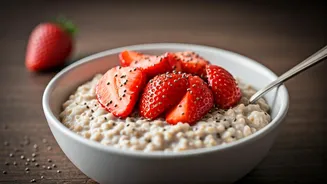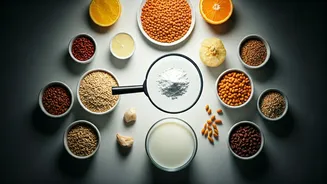Celery: The Detoxifier
Celery, often underestimated, is a potent diuretic. It aids in flushing out excess uric acid from the body. Celery contains compounds that can reduce inflammation,
a common issue in conditions associated with high uric acid. To integrate celery into your diet, consider adding it to salads, smoothies, or using it as a crunchy snack with dips. You can also juice celery, consuming it daily to maximize its benefits. Consistent celery intake over a month can show noticeable improvements, helping manage uric acid levels. This vegetable also provides essential vitamins and minerals, supporting overall health and making it an excellent choice for a well-rounded diet, addressing multiple aspects of wellness with each serving. Its versatile nature allows for easy incorporation into various meals, ensuring you can enjoy its advantages regularly without dietary restrictions.
Cherries: Nature's Remedy
Cherries are celebrated for their ability to combat high uric acid levels. These fruits possess anthocyanins, which have anti-inflammatory properties that reduce swelling and pain associated with gout, a condition caused by excess uric acid. Incorporating cherries into your diet can involve consuming them fresh, frozen, or as juice. Research suggests that regular cherry intake can significantly lower uric acid concentrations. For optimal results, aim to include cherries in your diet daily, either as a standalone snack or incorporated into meals and desserts. In addition to their impact on uric acid, cherries provide essential antioxidants, which protect cells from damage and boost the immune system. Consider adding cherries to your breakfast cereal, blending them into smoothies, or enjoying them as a refreshing dessert option to harness their benefits.
Tomatoes: Antioxidant Powerhouse
Tomatoes, rich in lycopene and vitamin C, are effective in lowering uric acid levels. These nutrients act as antioxidants, helping to reduce inflammation and oxidative stress. Adding tomatoes to your diet is easy, as they can be included in various dishes, from salads and soups to sauces and stews. Consuming tomatoes regularly can aid in managing uric acid levels, which is crucial for preventing gout and other related conditions. To maximize the benefits, you can consume tomatoes in different forms – raw, cooked, or as juice. The versatility of tomatoes makes it simple to integrate them into your everyday meals. In addition to their impact on uric acid, tomatoes are loaded with other essential vitamins and minerals that promote overall health. These include Vitamin K, potassium, and folate, which further enhance their value as a key component of a health-conscious diet.
Spinach: Nutrient-Rich Option
Spinach, though often linked with oxalate content, is still beneficial for managing uric acid due to its antioxidant and anti-inflammatory properties. Spinach is a good source of vitamins A, C, and K, as well as minerals such as iron and folate. To incorporate spinach into your diet, consider adding it to salads, smoothies, or cooking it in various dishes. Regular consumption of spinach can help in managing uric acid levels, supporting a healthier lifestyle. The nutrients in spinach support the body’s detoxification processes. The inclusion of spinach in your diet provides a range of health benefits, including enhanced immune function and reduced inflammation, making it a valuable addition to your diet. The versatility of spinach allows it to be used in a variety of dishes, ensuring that its benefits are easily accessible and enjoyable for everyday consumption.
Cucumbers: Hydration and Relief
Cucumbers are a fantastic choice due to their high water content and diuretic effects, helping the body flush out excess uric acid. This simple vegetable is also known for its anti-inflammatory properties, providing additional benefits in reducing uric acid levels. Including cucumbers in your diet is straightforward, as they can be added to salads, sandwiches, or consumed as a refreshing snack. To maximize their benefits, consider incorporating cucumbers into your daily routine. Additionally, cucumbers offer significant hydration and essential vitamins and minerals. The regular consumption of cucumbers supports the body's natural detoxification processes and promotes overall well-being. These low-calorie vegetables are a great addition to any diet, aiding in both hydration and uric acid management. Their versatility makes them a valuable component of a healthy lifestyle.



















